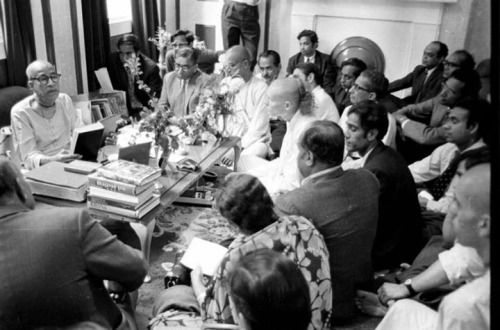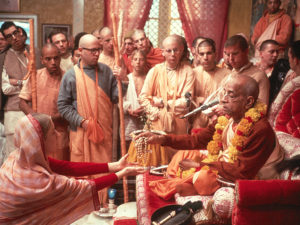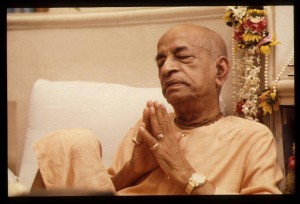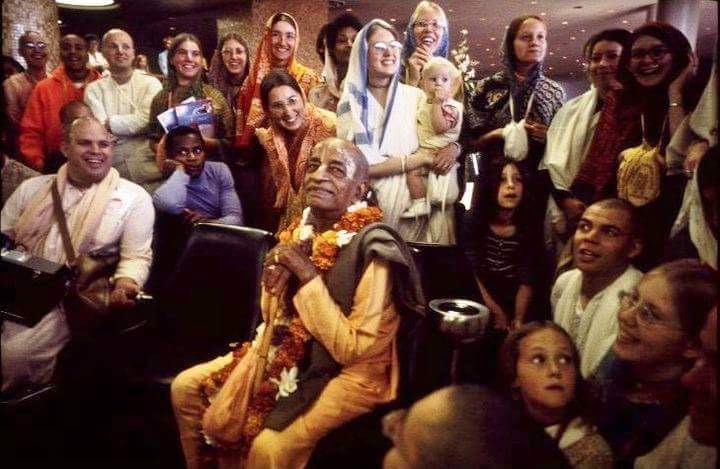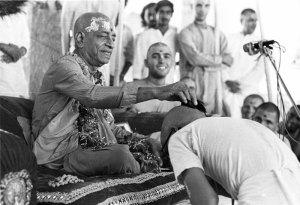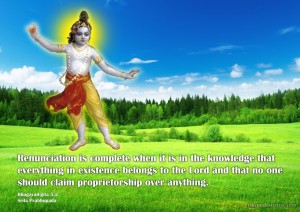
Hare Krishna,
As we progress in Krishna Consciousness it is important to check whether our train is going on the right track. And ours is a special train that runs on three parallel tracks- sādhu śāstra and guru!
Why is it important to me?
Narottama dāsa Ṭhākura states that one has to ascertain the right path for his activities by following in the footsteps of great saintly persons and books of knowledge under the guidance of a spiritual master (sādhu-śāstra-guru-vākya). A saintly person is one who follows the Vedic injunctions, which are the orders of the Supreme Personality of Godhead. The word guru refers to one who gives proper direction under the authority of the Vedic injunctions and according to the examples of the lives of great personalities. The best way to mold one’s life is to follow in the footsteps of the authorized personalities.
They act as checks and balances
Sādhu, whose character is spotless, he’s called sādhu. Śāstra means scripture, and guru, guru means spiritual master. They are on the equal level. Why? Because the medium is scripture. Guru is considered to be liberated because he follows the scripture. Sādhu is considered to be honest and saintly because he follows scripture. Sādhu-śāstra-guru-vākya. Nobody can become a sādhu if he does not accept the principles of scripture. Nobody can be accepted as guru, or spiritual master, if he does not follow the principles of scripture. This is the test.
(Lecture – New York, December 26, 1966)
Can we understand it in more detail please!
Spiritual realization can be perfected by three parallel process. Sādhu. Sādhu means saintly persons, who are realized souls, sādhu. And śāstra. Śāstra means scriptures, authoritative scriptures, Vedic scriptures, śāstra. Sādhu, śāstra and guru, a spiritual master. Three parallel lines. And if you place your car or vehicle on these three parallel lines, your car will go direct to Kṛṣṇa. Tinete kariyā aikya.
Just like in the railway line you see two parallel lines. If they are in order, the railway carriages are carried very smoothly to the destination. Here also, there are three parallel lines—sādhu, śāstra, guru: saintly person, association of saintly person, acceptance of bona fide spiritual master, and faith in the scriptures. That’s all. Then your carriage will be going nicely, without any disturbance. Sādhu śāstra guru vākya, cittete kariyā aikya.
So here in the Bhagavad-gītā, the Supreme Personality of Godhead explaining Himself, Kṛṣṇa. So if you say, “How can I believe that Kṛṣṇa said? Somebody has written in the name of Kṛṣṇa that ‘Kṛṣṇa said,’ ‘God said.’ ” No. This is called disciplic succession. You will see in this book, Bhagavad-gītā, Kṛṣṇa, what Kṛṣṇa said, and how Arjuna understood. These things are described there.
And the sādhu, saintly person, beginning from Vyāsadeva, Nārada, down to many ācāryas, Rāmānujācārya, Madhvācārya, Viṣṇu Svāmī, and latest, Lord Caitanya, in this way, they have accepted, “Yes. It is spoken by Kṛṣṇa.” So this is the proof: if saintly persons have accepted. They have not denied. Authorities, they have accepted, “Yes.” This is called sādhu. And because sādhu, saintly persons, have accepted, therefore it is scripture. That is the test. Just like . . . it is common sense affair. If the lawyers accept some book, then it is to be understood that this is law book. You cannot say that “How can I accept this is law?” The evidence is the lawyers are accepting. Medical . . . if the medical practitioners accept, then that is authoritative medical book. Similarly, if saintly persons are accepting Bhagavad-gītā as scripture, you cannot deny it.
So sādhu śāstra: saintly person and scriptures, two things, and with spiritual master, three, three parallel lines, who accept the sādhu and the scripture. Sādhu confirms the scripture and spiritual master accept the scripture. Simple process. So they are not in disagreement. What is spoken in the scripture is accepted by saintly person, and what is spoken in the scripture, the spiritual master explains only that thing. That’s all.
So via media is the scripture. Just like lawyer and the litigants—via media is the law book. Similarly, the spiritual master, the scripture . . . saintly person means who confirms the Vedic injunction, who accepts. And scripture means what is accepted by the saintly person. And spiritual master means who follows the scripture.
So things equal to the same thing are equal to one another. This is axiomatic truth. If you have got hundred dollars, and another man has got hundred dollar, and if I have got hundred dollar, then we are all equal. Similarly, sādhu śāstra guru vākya, when these three parallel lines in agreement, then life is success.
(SP Lecture, 18/10/1968, Seattle)
This the process
When a man comes into good consciousness and accepts a saintly person as a spiritual master, he hears many Vedic instructions in the form of philosophy, stories, narrations about great devotees, and transactions between God and His devotees. In this way a man becomes refreshed in mind, exactly like a person who smears scented sandalwood pulp all over his body and decorates himself with ornaments. These decorations may be compared to knowledge of religion and the self……. One cannot return to Kṛṣṇa consciousness unless he is favored by the instructions of a saintly person. Therefore Śrīla Narottama dāsa Ṭhākura sings, sādhu śāstra guru vākya, cittete kariyā aikya. If we want to become saintly persons, or if we want to return to our original Kṛṣṇa consciousness, we must associate with sādhu (a saintly person), śāstra (authoritative Vedic literature) and guru (a bona fide spiritual master). This is the process.
Srila Prabhupada openened this opportunity for us
So this Kṛṣṇa consciousness movement is giving chance to everyone to hear from the authoritative sources, from the śāstra. Sādhu śāstra guru. These are authorities. So instead of hearing from the unauthorized persons….
(SP Lecture- Bhuvanesvara, January 22, 1977)
Finally, it is upto us…
Vāsudeva is always ready to help us, provided we want to take help from Him. And He, not only internally He is helping, externally also, He’s sending His representative to teach us. And there is śāstra, just like this Śrīmad-Bhāgavatam. Sādhu, śāstra, guru. Guru is there, śāstra is there, saintly persons are there. You take advantage. And the Lord is there within yourself. So why don’t you take? This is intelligence.
(SP Lecture on SB 1.7.7 — Vrndavana, September 6, 1976)
I pray and hope that this compilation was somehow meaningful and inspires us to regularly hear Srila Prabhupada’s lectures and read his books.
All glories to Srila Prabhupada.
Your Servant,
Giriraj dasa

